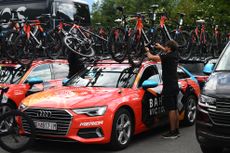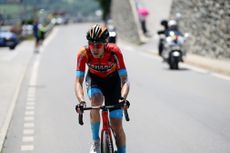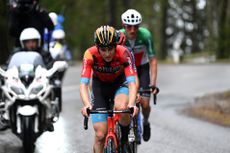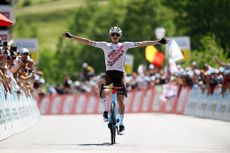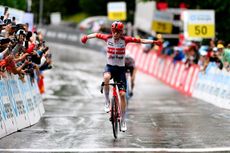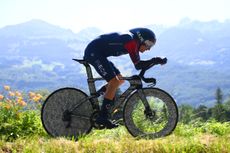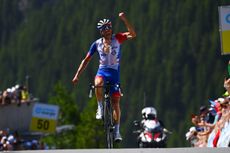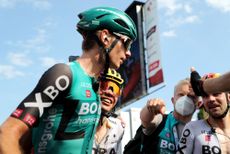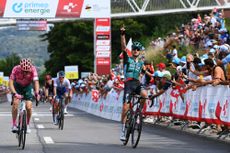Tour de Suisse
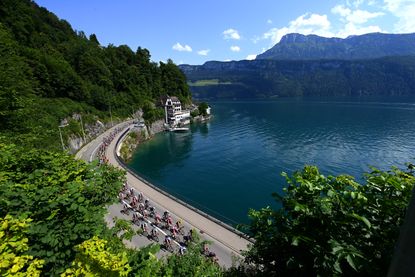
| Dates | Sun 11 - Sun 18 June |
| Total distance | 1,097km |
| Stages | 8 |
| Start | Einsiedeln |
| Finish | Abtwil |
| UCI ranking | 2.UWT |
| Edition | 86 |
| Total climbing | 18,384m |
| 2022 winner | Geraint Thomas (Ineos Grenadiers) |
| Leader's jersey colour | Yellow |
| TV coverage (UK) | GCN, Eurosport, Discovery |
Where: Switzerland
When: 11-18 June 2023
Rank: UCI WorldTour
Along with the Critérium du Dauphiné, the Tour de Suisse is one of the key preparation events for riders taking part in the Tour de France, in addition to being a prestigious WorldTour race in its own right. In 2023, it takes place between 11-18 June, featuring eight stages.
So far announced on this year's startlist are Tour riders including Wout Van Aert (Jumbo-Visma), Tom Pidcock and Michał Kwiatkowski (Ineos Grenadiers). Perhaps attracting the most attention though is Remco Evenepoel, who won't in fact be riding La Grande Boucle.
Also down to ride are Biniam Girmay (Intermarché-Circus-Wanty), Quinn Simmons (Trek-Segafredo) and Jay Vine (UAE Team Emirates).
Last year's winner was Geraint Thomas (Ineos Grenadiers), who deposed erstwhile leader Sergio Higuita (Bora-Hansgrohe) on the final day time trial. Thomas is giving the race a miss this year after his recent near-miss at the Giro d'Italia.
The race traditionally features a mixture of time trials, relatively flat stages for the sprinters and high mountains. In the past, the weather has also played a part in the event, with the high mountain passes often affected by poor conditions and snowfall.
This year the Tour de Suisse covers much of the country, describing a roughly anti-clockwise loop. There are two time trials which bookend the race and could prove a happy hunting ground for Wout Van Aert or Remco Evenepoel. The high mountain action is found midweek, and is flanked by lumpy stages either side. There are no obvious bunch sprints in there – though that's not to say they're out of the question.
Tour de Suisse 2023 route
| Stage | Date | Start | Finish | Distance | Type |
| 1 | Sun 11 June | Einsiedeln | Einsiedeln | 12.7km | Flat ITT |
| 2 | Mon 12 June | Beromünster | Nottwill | 173.7km | Hilly |
| 3 | Tues 13 June | Tafers | Villars-sur-Ollon | 143.8km | Mountains |
| 4 | Weds 14 June | Monthey | Leukerbad | 152.5km | Mountains |
| 5 | Thurs 15 June | Fiesch | La Punt | 211km | Mountains |
| 6 | Fri 16 June | La Punt-Chamues-ch | Oberwil-Lieli | 215.3km | Hilly |
| 7 | Sat 17 June | Tübach | Weinfelden | 183.5km | Hilly |
| 8 | Sun 18 June | St Gallen | Abtwil | 25.7km | ITT |
The full route for the Tour de Suisse 2023 begins with a short, flat time trial, which should establish a pecking order. Beginning in the town of Einsiedeln, it crosses the artificial lake Silhsee before looping around the northern perimeter and back into the town.
The stage two will introduce riders to the hills that the Tour de Suisse is renowned for, on what is a mid-distance day with three cat-three climbs. The sprinters will be eyeing this one up as one of their better (only?) chances.
Stage three to Villars-sur-Ollon will force the GC players to show their hand, taking them over two cat-one climbs and finishing on the summit of the second one. These are proper mountains now; the first climb, the Col des Mosses, takes the riders up to 1,446m, on a 13.5km climb at 4.1%, while the second and final climb to Villars at 1,256m is 10.7km long at an average 7.8%. At just 143km, this is a stage that will be raced hard and fast.
Backloaded with two cat-one climbs just like the previous day, stage four to Leukerbad is another tough proposition. This time though, the riders will also tackle a cat-three ascent between the two biggies. While it isn't strictly a summit finish, it almost could be, because after the riders crest the Höhenweg, there are less than three kilometres of downhill before the road rears up again for a 1.2km climb to the finish. Of the two major climbs, the riders first tackle Crans-Montana (14.6km at 6.7%) summiting it with 56.5km to ride. After gobbling up the cat-three Varenstrasse with 34km to go they take on the Höhenweg. It's a bit of a beast at 19km long, with some very steep lower slopes. It's also a double-summit with a dip in the middle, giving it an innocuous 4.1% average that belies the real challenge. A key GC day.
At 211km long, with two hors-cat and one cat-one climb that all take the riders over 2,000m, stage five is undoubtedly the queen stage. Two of them come not long after the start, but this is sure to soften up already tired legs, before a mid-stage lull and then the big push on the final climb before a descent to the finish at La Punt-Chamues-ch.
The Furkapass (16.5km at 6.4%) is the first, and highest climb of the day at 2,433m. In short order comes the cat-one Oberalpass (10.7km at 5.6%), followed by a 100km of phoney war where a breakaway could engineer some TV time. The riders go through the final intermediate sprint with 37km to go and then start climbing the second HC climb, the Albulapass (17.4km at 6.8%), cresting it with only a 9.5km descent separating them from the finish line.
What comes down must go up, and the weary riders will find themselves climbing yesterday's descent to the finish straight out of the blocks on stage six. While still very lumpy, it's a notable step down in severity compared to the past couple of days, with that initial cat-one over the Albulapass, plus a cat-two climb early on, and just a pair of cat-threes to come – one mid-stage, one near the end. As long as the sprinters don't lose too much on those early ascents, they have the whole stage to get back on and potentially contest the finish at Oberwil-Lieli.
Stage seven is another tough day in the hills, with four classified climbs – a cat-one, cat-two and a pair of cat-threes. The hardest climbs are in the first half of what is a 183km day, so rather than a GC day, this looks like one for a breakaway, or perhaps for the sprinters who can also climb.
The race ends as it began – with a time trial. Compared to any of the road stages this is a flat stage, though still has a gentle roll to it. With the real possibility that it could influence the final standings, it should keep the tension up right to the end.
About the Tour de Suisse
The Tour de Suisse – also referred to in English as the Tour of Switzerland – has a long and storied history. It was first run in 1933 as a five-stage race that started and finished in Zürich.
Beginning as a September, and then August, appointment, it established its June pre-Tour slot in the 1950s.
Early editions were most often won by home riders, including big-name Tour de France winners such as Hugo Koblet and Ferdi Kübler. But by the 1970s the Swiss were rarely having it their own way. The last home victor was Classics star Fabian Cancellara in 2009.
The 2023 edition will be the 86rd edition of the race, which wasn't held for three years during World War Two and was also cancelled in 2020 because of the pandemic.
Tour de Suisse: Recent winners
2022: Geraint Thomas (GBr) Ineos Grenadiers
2021: Richard Carapaz (Ecu) Ineos Grenadiers
2020: No race
2019: Egan Bernal (Col) Team Ineos
2018: Richie Porte (Aus) BMC Racing Team
2017: Simon Špilak (Slo) Katusha-Alpecin
2016: Miguel Ángel López (Col) Astana
2015: Simon Špilak (Slo) Katusha
2014: Rui Costa (Por) Lampre-Merida
2013: Rui Costa (Por) Movistar Team
2012: Rui Costa (Por) Movistar Team
2011: Levi Leiphemier (USA) RadioShack
2010: Fränk Schleck (Lux) Saxo Bank
2009: Fabian Cancellara (Swi) Saxo Bank
2008: Roman Kreuziger (Lux) Liquigas
2007: Vladimir Karpets (Rus) Caisse D'Epargne
Latest
-

Tour de Suisse stage six neutralised in tribute to Gino Mäder
Peloton to ride final 20km of route in memory of Swiss rider
By Tom Davidson Published
-

Gino Mäder dies after Tour de Suisse crash, aged 26
'His talent, dedication, and enthusiasm were an inspiration to us all,' says Bahrain Victorious boss
By Tom Davidson Published
-

Gino Mäder resuscitated after terrifying Tour de Suisse crash
The Swiss rider was found unresponsive and airlifted to hospital
By Tom Davidson Published
-

Felix Gall powers to first major career win and overall race lead on stage four of Tour de Suisse
Gall takes over the GC lead from Mattias Skjelmose with Remco Evenepoel in third
By Tom Thewlis Published
-

Mattias Skjelmose drops Remco Evenepoel to take Tour de Suisse lead and stage three victory
22-year-old tops GC by 17 seconds ahead of world champion
By Tom Davidson Published
-

Geraint Thomas takes overall victory at Tour de Suisse as Remco Evenepoel wins stage eight time-trial
The Welshman has found his form ahead of the Tour de France
By Pete Trifunovic Last updated
-

Thibaut Pinot wins Tour de Suisse stage seven as Sergio Higuita takes the overall lead
The Frenchman secured his second win of the year
By Pete Trifunovic Last updated
-

Covid threatens to disrupt Tour de France line-up
Virus sweeps through the peloton at key preparation races with Tour de Suisse race leader Vlasov forced to abandon
By Tom Thewlis Last updated
-

Aleksandr Vlasov victorious on stage five of the Tour de Suisse as he moves into overall lead
The Bora-Hansgrohe rider launched a superior sprint in the final 200m as he just managed to hold onto the stage win
By Ryan Dabbs Published

